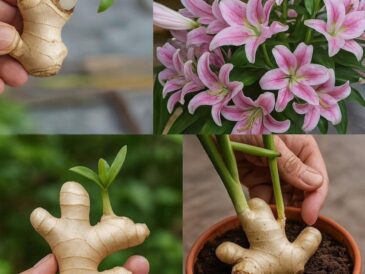Respiratory health is crucial to overall wellness, and nothing feels better than breathing freely when congestion, coughs, or chest tightness strike. For centuries, cultures around the world have relied on natural remedies to soothe their lungs, reduce mucus buildup, and calm irritated throats without relying on harsh pharmaceuticals. Among these time-honored solutions is a potent herbal tea made from thyme, ginger, garlic, honey, and lemon — ingredients celebrated for their remarkable healing properties.
This article will guide you through every detail about this powerful lung-healing tea: the science behind each ingredient, step-by-step preparation instructions, the incredible health benefits, safety considerations, and tips to maximize its effectiveness. Whether you’re battling seasonal colds, allergies, or chronic respiratory discomfort, this tea offers a natural, soothing way to support your lungs and airways.
Understanding Respiratory Health and the Need for Natural Support
The respiratory system is your body’s lifeline to oxygen, essential for every cell and organ function. However, it is vulnerable to infections, irritants, allergens, and environmental pollutants that can cause inflammation, excess mucus production, and discomfort.
Common respiratory issues include:
- Bronchitis – inflammation of the bronchial tubes causing mucus buildup and cough.
- Common cold and flu – viral infections often leading to sore throat and congestion.
- Sinusitis – inflamed sinuses with post-nasal drip contributing to cough.
- Asthma and allergies – causing airway inflammation and mucus overproduction.
- Chronic obstructive pulmonary disease (COPD) – progressive lung disease leading to breathing difficulties.
Many conventional treatments rely on medications like decongestants, cough suppressants, or antibiotics, which can sometimes cause unwanted side effects and do not always address underlying inflammation or mucus viscosity. This has fueled growing interest in natural remedies that support respiratory wellness holistically.
The Herbal Tea: Ingredients and Their Science-Backed Benefits
This powerful tea harnesses five natural ingredients known to promote lung health and alleviate respiratory symptoms. Let’s break down the benefits of each component.
1. Thyme (Thymus vulgaris)
Thyme is more than just a culinary herb; it has long been used in traditional medicine for respiratory ailments. Thyme contains compounds like thymol and carvacrol, which exhibit:
- Antimicrobial properties: Helps fight bacterial and fungal pathogens that can infect the respiratory tract.
- Expectorant effects: Promotes loosening and expulsion of mucus from the lungs.
- Anti-inflammatory actions: Reduces airway inflammation to ease breathing.
Clinical studies have shown thyme extract’s effectiveness in reducing cough frequency and severity, making it a staple in natural cough syrups and remedies.
2. Ginger (Zingiber officinale)
Ginger is renowned for its wide-ranging medicinal benefits, including its impact on respiratory health. Key properties include:
- Anti-inflammatory: Gingerol, the bioactive compound in ginger, inhibits inflammatory pathways that contribute to swollen airways.
- Antioxidant: Helps reduce oxidative stress in lung tissues.
- Mucolytic: Aids in breaking down mucus, improving its clearance.
Ginger is widely used in treating cold symptoms, sore throats, and bronchitis, with research confirming its potential to ease congestion and soothe irritation.
3. Garlic (Allium sativum)
Garlic is a potent natural antibiotic and immune booster. Its key benefits for the respiratory system are:
- Antibacterial and antiviral: Helps combat respiratory pathogens.
- Anti-inflammatory: Reduces swelling in the airways.
- Immunomodulatory: Enhances the body’s immune defenses against infections.
Allicin, garlic’s main active compound, is responsible for much of its healing power. Regular consumption of garlic is linked to fewer respiratory infections.
4. Honey
Honey has been used for centuries to soothe sore throats and coughs. Its benefits include:
- Antimicrobial: Contains enzymes that inhibit bacteria.
- Soothing agent: Coats the throat to reduce irritation.
- Antioxidant and anti-inflammatory: Supports immune function.
Honey also enhances the taste of the tea, making it easier to consume regularly.
5. Lemon Juice
Lemon is a rich source of vitamin C and citric acid, providing:
- Immune support: Vitamin C boosts white blood cell function.
- Mucus thinning: Citric acid helps loosen mucus.
- Alkalizing effect: Helps balance the body’s pH and reduce inflammation.
Lemon also adds a fresh, tangy flavor, complementing the other ingredients.
How to Make the Lung-Healing Herbal Tea: Step-by-Step Instructions
Ingredients:
- 2 cups of water
- 1 teaspoon fresh thyme leaves (or ½ teaspoon dried thyme)
- 1 teaspoon freshly grated ginger
- 1 clove garlic, crushed
- 1 teaspoon honey (optional, added after boiling)
- Juice of half a lemon
Preparation:
- Boil the water: Bring 2 cups of water to a rolling boil in a pot or kettle.
- Add the herbs: Once boiling, add thyme leaves, grated ginger, and crushed garlic to the water.
- Simmer: Reduce the heat and let the mixture simmer for 5 to 7 minutes. This process extracts the beneficial compounds from the herbs.
- Strain: Pour the tea through a fine mesh strainer into a cup to remove solid particles.
- Add honey and lemon: Once the tea has cooled slightly (to avoid destroying honey’s enzymes), stir in honey and freshly squeezed lemon juice.
- Sip slowly: Drink the tea warm, ideally twice a day during times of cough, congestion, or respiratory discomfort.
When and How to Consume for Best Results
Click page 2 for more




